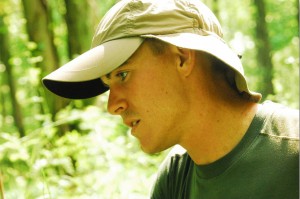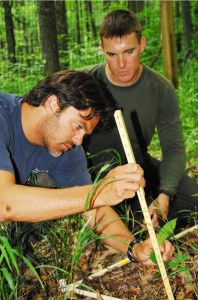This summer the SERC interns had a unique addition to their ranks – Iraq veteran Kiel Edson, a former Marine finishing his last year of undergrad at California State University, Sacramento. In this edited Q&A, the 28-year-old shares thoughts on Iraq, SERC and the transition from soldier to researcher.

After five years working as a Russian linguist for the Marines, 28-year-old Kiel Edson started college and discovered his passion for conservation biology. (Credit: Michael Tobias.)
What kind of work did you do for the Marines in Iraq?
E: I was part of a group of what’s called Signal Support Team. We basically go out onto missions off the base, closer to the main cities, and we collect intelligence on what’s happening within the city. And then anything relevant that we find, we basically just write-up in situation reports or intelligence reports and send them off to the commanders who are making decisions as to how to handle the situations in that city. We just tell them, hey, they know that you’re going to ambush, or they know about the convoy going through on Thursday, so that they can change the way that they operate to avoid taking casualties, or they know going in there’s going to be a firefight, so everybody’s prepared for it. It’s not a surprise.
How has your experience in the Marines impacted your life as a student?
E: You learn a lot about yourself in those sorts of environments, because they’re really, really stressful. You don’t get to experience seriously life-threatening situations when you’re 20 very often. So you kind of reassess what’s important to you. You learn a lot about yourself, and you come home enjoying life more or appreciating the stuff you had taken for granted in the past. And I think that helped me with school too, aside from learning how to study. I like school now. I realize how easy it is to have this life where I go to school and I work. It’s very low-stress.
Did serving with the Marines help you at all with research this summer?
E: Field work can be strenuous. And it’s the summer, it’s hot. But you get completely numb to discomfort in the Marines. They subject you to crazy, crazy stuff. So you just get used to being able to tolerate – you can tolerate a lot of discomfort and push all of that aside. It’s kind of detached from the experience, and you just focus on what you have to do.
This summer you worked with John Parker on a three-year project on deer, logging and invasive species. Could you explain how all those fit together?
E: There are ideas that non-native species are really good competitors in a lot of ways, because they escape their natural enemies, basically. There’s a theory called the enemy release hypothesis, that they leave all of the herbivores that have co-evolved with them to feed on them. They move away from those into new areas where they’re uncommon….Like the deer around here, the white-tailed deer, will heavily browse on the native species and not on the non-native species, so they’re disadvantaging those natives and leaving the non-natives alone.

Lab head John Parker measures a sapling in one of the forest plots he constructed with his interns this summer. The 1mx1m plots helped them track whether deer and logging give invasive species an edge over natives. (Credit: Michael Tobias.)
E: Because logging is a lot of disturbance. There’s lots of exposed earth, lots of light. Both natives and non-natives in that case will actually grow better, because light is a limiting resource in the forest. So when there’s an abundance of it, everything grows better. Natives and non-natives alike. But because of that disturbance now, the non-natives are really able to encroach into a territory where they had been previously excluded.
Did your study support this idea that logging helps invaders?
E: Our study, or at least the data that we’ve analyzed so far, only shows that it benefits both natives and non-natives. It didn’t show necessarily that there was a higher percentage of non-natives in the logged area. So it looks like the availability of light means that they both benefit. The difference is that in past studies, they have found that that disturbance is kind of the first step. It brings in the non-natives initially, and then they can thrive and get established a little bit, so that they can start to spread.
What does this mean for people trying to manage the forest?
E: After a logging event, forest managers are expecting the forest to regenerate and then resemble what they had just removed. So if there are invasive species coming in that previously weren’t there, and they’re outcompeting some of the native species as they try to regrow, the forest 100 years from now will likely not look like the forest that they just removed. And then if you’re trying to manage a forest sustainably, that’s not going to be possible, because every timber harvest, you’re bringing in species that didn’t exist before.
You mentioned earlier that you’re hoping to follow a career in environmental policy. Will this internship help you with that?
E: Absolutely. Most of the schools I’m looking at, the policy program is like an aside to the science. They expect you to come out, and you need to be science-savvy. You need to be able to understand all of the research that’s coming out of academia and turn it into something that laymen can understand….
But in the end you need to be a scientist first that understands how policy works, not the other way around. You don’t want to just be a businessman who dabbles in science, because the science is the complicated part. The policy – not to say the policy’s not complicated, but you need to focus a lot on science to really be able to be fluent in that language. And then you can apply what you’ve learned to policy decisions and things like that and try to steer how governments interact with the planet.


I feel impressed by how missions in Signal Support Team can serve objectives and how a student can change his way of living after that.
I agree with you thaht environmental policy seems to be a logical future career for you.
I sincerely wish you success.